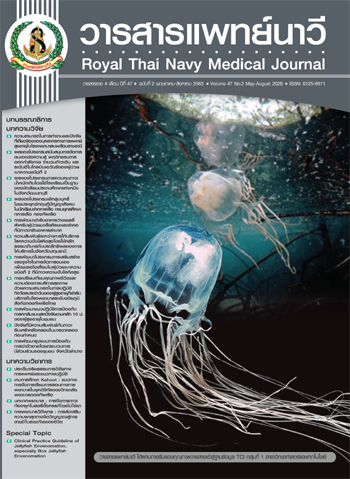Nurse’s Roles in Gestational Constipation Management in Pregnant Women without Medication
Main Article Content
Abstract
Gestational constipation, hormonal changes during pregnancy and changes in pregnancy mechanisms can cause discomfort and might be severe when pregnant women suffer during bowel movements. Pregnant women are at risk for constipation during every stage of pregnancy. In pregnant women with good health, gestational constipation can usually be managed either pharmacologically or non-pharmacologically. At present, however, hospitals at nearly every level in Thailand have practiced guidelines for managing gestational constipation without medication according to the guidelines provided by the Thai Neurogastroenterology and Motility Society, which is only part of the knowledge and advice available on the prevention and treatment of gestational constipation. Furthermore, most pregnant women with the problem of constipation are treated with laxatives. The use of laxatives is aimed at temporary constipation relief and does not offer long-term solutions or management of this problem; because fecal excretion is an important health behavior everyone should practice as an ongoing habit. Nurses are important in providing care for pregnant women in order to achieve positive pregnancy outcomes. Hence, nurses require knowledge and understanding about the management of gestational constipation in pregnant women without medication, using the nursing process in assessing health and offering consultation on the management of gestational constipation in pregnant women without medication for comprehensive coverage in providing nursing care, which will result in changes in the excretory behavior of pregnant women with positive effects on the health of pregnant women and their developing fetuses. Nurses tend to be interested in the problem of patients’ constipation, but lack assessment in practice and planned management of constipation. This article presents factors, effects and nurse’s roles in constipation management without medication in pregnant women.
Article Details

This work is licensed under a Creative Commons Attribution-NonCommercial-NoDerivatives 4.0 International License.
References
Cullen G, O’Donoghue OD. Constipation and pregnancy. Best Practice & Research Clinical Gastroenterology 2007;21(5):807-18.
Trottier M, Erebara A, Bozzo P. Treating constipation during pregnancy. Can Fam Physician 2012;58(8):836-8.
Derbyshire E, Davies J, Costarelli V, Dettmar P. Diet, physical inactivity and the prevalence of constipation throughout and after pregnancy. Matern Child Nutr 2006;2(3):127-34.
World Gastroenterology Organization. World Gastroenterology Organization Global Guidelines, Constipation: a global perspective. World Gastroenterology Organization 2010;45(6):1-13.
Eberhardie C. Constipation: identifying the problem. Nurs Older People 2003;15(9):22-6; quiz 28.
Ireland B. Pregnancy induced constipation. Professional Nursing Today 2006;10(3):58-60.
Johnson P, Mount K, Graziano S. Functional bowel disorders in pregnancy: effect on quality of life, evaluation and management. Acta Obstet Gynecol Scand 2014;93(9):874-9.
Arnaud MJ. Mild dehydration: a risk factor of constipation. Eur J Clin Nutr 2003 Dec;57 (Suppl 2):S88-95.
Porterfield SP. Endocrinology in pregnancy. In: Porterfield SP, editor. Endocrine physiology. London: Mosby; 2001. p. 197-214.
Chongchaithet N, Peungphan V, Euengsongtham P, Boonchoo W. Research report: dietary fiber, sugar, and minerals in fruits. Nonthaburi: Bureau of Nutrition (BoN), Department of Health, Ministry of Public Health; 2012. (in Thai).
Hinrichs M, Huseboe J, Tang JH, Titler MG. Research-based protocol: management of constipation. J Gerontol Nurs 2001;27(2):17-28.
Maloni JA. Lack of evidence for prescription of antepartum bed rest. Expert Rev Obstet Gynecol 2011;6(4):385-93.
Thai Neurogastroenterology and Motility Society. Guideline for management of chronic constipation. [Internet]. [cited 2020 April 24]. Available from: http://www.thaimotility.
or.th/files/15_1.Constipation_bookletA5_NEW_5.pdf.
Shafik A, El-Sibai O. Study of the levator ani muscle in the multipara: role of levator dysfunstion in defecation disorders. Journal of Obstetrics and Gynecology 2002;22(2):187-92.
Grundy J, Husbands E. Clinical care guidelines: constipation guidelines. [Internet]. [cited 2020 April 24]. Available from: http://virtualhospice.ca/Assets/Constipation%20Guideline_
with%20appendices_St%20Richard%27s%20Hospice.%20pdf_20100505160131.pdf.
Vazquez JC. Constipation, haemorrhoids, and heartburn in pregnancy. BMJ Clin Evid 2010 Aug 3;2010:1411.
Thompson WG, Drossman DA, Talley NJ, Walker L, Whitehead WE. Rome III diagnostic questionnaire for the adult functional GI disorders. Gastroenterology 2006;130:1480-91.
Sribout S, Baosoung C, Sansiriphun N. Effect of self-regulation in defecation enhancement on constipation among pregnant women. Journal of Boromarajonani College of Nursing, Bangkok 2018;34(3):11-22. (in Thai).
Jefferson A, Croton J. Using wheat bran fibre to improve bowel habits during pregnancy – a call to action. BMJ 2013;21(5):204-12.
Folden LS, Backer HJ, Gilbride AJ, Maynard F, Pires M, Stevens K, Jones K. Practice guidelines for the management of constipation in adults. Rehabilitation Nursing Foundation 2002;27(5):169-75.
European Food Safety Authority. Scientific opinion on dietary reference values for water. E FSA Journal 2010;8(3):1-4.
Jewell D, Young G. Interventions for treating constipation in pregnancy. Cochrane Database Syst Rev 2001;(2):CD001142.
Wald A. Constipation. Med Clin North Am 2000;84(5):1231-46.
Bandura A. Social cognitive theory of self-regulation. Organizational Behavior and Human Decision Process 1991;50(2):248-87.


